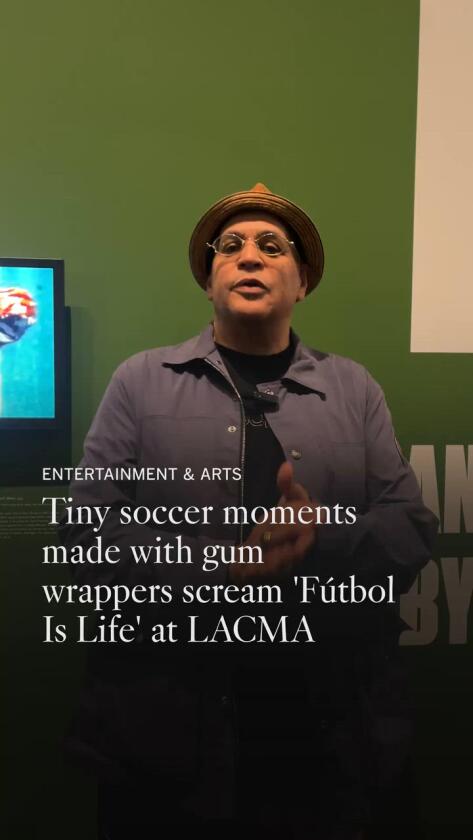‘Fútbol Is Life’ at LACMA: Tiny World Cup moments full of whimsy
Lyndon J. Barrois Sr. always knew he wanted to be an artist, even as a child.
From crafting figures out of chewed gum stuck underneath the pews at his Catholic school’s church after he was forced to scrape them as punishment from teachers to collecting his mother’s discarded gum wrappers, Barrois felt a creative itch to make something out of nothing.
“I had seen too much art [and thought to myself], ‘Someone had to be doing this, why not me?,’” Barrois said with a chuckle. “I always dreamt of doing this. Other kids played with Play-Doh. I made stuff with anything I could get my hands on like clay, aluminum foil and discarded phone wire.”
-
Share via
Now the 61-year-old New Orleans native is debuting his latest project at the Los Angeles County Museum of Art: “Fútbol Is Life.” It depicts some of the most iconic plays and political moments in the 95-year history of the FIFA World Cup, coming to L.A. this summer, with “humble” gum wrappers.
Barrois and LACMA curator Britt Salvesen assembled 60 works, including 40 vignettes from past World Cups and four animated short films, among them the movie “Fútballet,” which re-creates 21 famous scenes on a 50-inch soccer pitch.

Suspended artwork of Brazilian Swedish footballer Marta Vieira da Silva, known mononymously as Marta, made by Barrois. He made a conscious effort to feature women’s contributions to soccer.
(Allen J. Schaben / Los Angeles Times)
A large-scale projection of a miniature of French footballer Kylian Mbappé hangs on the wall. Two life-size replicas of Argentina’s Lionel Messi and Brazil’s Marta Vieira da Silva hang from the ceiling, the first of their kind for the artist, who has done miniatures of NBA legend Kobe Bryant and NFL star Patrick Mahomes.
The exhibition is laid out to resemble a playing field.
“We really wanted to create that environment that you feel like you’re in a separate world, and my colleague Darwin Hu took a personal and creative interest in this,” Salvesen told The Times. “He did a bunch of visual research on soccer fields in schools and prisons, where fields were improvised in whatever spaces were available. We wanted to wrap the lines up the walls and have the turf. Your sense of the space changes when you go from a hard floor to a softer floor.”

With a suspended Lionel Messi at right, Noa Carter, 4, and dad Darius L. Carter of Pasadena get a preview of artist Lyndon J. Barrois Sr.’s LACMA exhibition, “Fútbol Is Life.”
(Allen J. Schaben / Los Angeles Times)
Barrois’ 1-inch tall “sportraits” are carefully painted to capture even the tiniest detail. The majority of the installations include a mirror, allowing the viewer to see themselves as part of the moments “frozen in time,” he said.
A total of 325 individual mini soccer and football players, including Portugal’s Cristiano Ronaldo, are included in the show.
“I had so much fun making the sculptures that when I was done, it was like hitting a wall after all that adrenaline,” Barrois said. “Now we get to hang it. Install it. You just start to see all the things we envisioned just come to life. I love this s—.”
Before sculpting, Barrois did “tons of research, a lot of reading, [looking at] photography and video.” He and a friend rewatched the most famous plays and examined the history surrounding the World Cup, stretching back to the 1930s, and before the Women’s World Cup started in 1970.

A “Sportraits” work shows the German soccer team highlighting migrant workers’ rights ahead of the 2021 World Cup. “I chose moments that I personally thought would be important, there’s a lot of politics involved,” Barrois said.
(Allen J. Schaben / Los Angeles Times)
“I just wanted to tell a story with the politics involved, like in 1938, the German team was all Nazis, and they’re doing the salute, and by 2022, the German team has human rights on their T-shirts,” Barrois said. “We also had the Iranian women project. All these things happened on such a huge platform. So it was a tough editing process to bring that down to 40.”
Barrois spent seven months completing his pieces.
Curator Sandra Jackson-Dumont, former director and CEO of the Lucas Museum of Narrative Art, applauded Barrois’ use of gum wrappers.
“I like that Lyndon is using materials that are a part of our everyday lives that we take for granted and we discard,” Jackson said. “He’s using those materials to make something creative.”
Barrois was surrounded by family and friends for the exhibition’s preview, most of whom grew up with the artist. Dany Wilson, who went to elementary school with Barrois, said he was “proud of him.”
The exhibition also features works from scientist Harold Edgerton and photographer Eadweard Muybridge that explore the history of motion studies and time-lapse photography.
‘Fútbol Is Life’
Where: LACMA, 5905 Wilshire Blvd., L.A.
When: Through July 12; closed Wednesdays
Admission: $21-$30; discounts for youth, seniors and students
Info: (323) 857-6000, lacma.org

